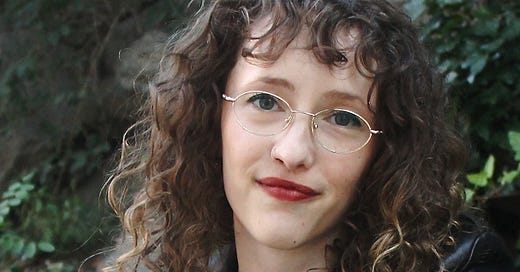Intimate conversations with our greatest heart-centered minds.
Lilly Dancyger’s writing is precise, searing, wise, driven by deeply rooted curiosity; it’s also gentle, whimsical, full of awe for this often difficult world in which we find ourselves. And Lilly herself is much the same. A wonderful combination of translucent honesty and thoughtfulness mixed with mischief and generosity and laughter.
Lilly’s 2021 memoir, Negative Space, is a tender, aching journey into the life of her beloved father, a member of the seminal eighties East Village art scene, who died when she was only twelve. The exquisite language and sure-footed storytelling scorched themselves onto my heart. Lilly also edited the anthology Burn It Down: Women Writing About Anger, which includes essays from Leslie Jamison and Melissa Febos. Her own essays have appeared in Guernica, Literary Hub, and Rolling Stone, to name a few. She’s worked as an editor at both Narratively and Catapult—and is one of the best freelance editors out there. If you’re feeling stuck with your work, shoot her an email! A graduate of Columbia journalism school, Lilly is currently teaching hybrid memoir in their MFA program as well as her own private workshops. And she’s a master of Twitter.
We chatted about lineage, cats, and what the heck happened to the East Village.
Your memoir, Negative Space, is one of my favorite memoirs ever. So, I wondered if we could start there and talk about what impact writing that has had on you now that it’s been out in the world for a year?
It’s definitely opened some doors and given me a feeling of legitimacy. It’s hard trying to find your place as a writer in the world when your biggest work exists only on your computer. Which I know is an experience that a lot of writers share in the often uphill battle of trying to get that first book out. I did as much as I could teaching and editing and freelancing and trying to establish myself without that, but I always had this feeling of there's more to me as a writer than people could see. The biggest piece of my writerly identity was not public for so long, which is a strange feeling, and I think contributes to a lot of the urgency of needing to rush to get it out. You want people to see that you really have done this big work, especially when it takes a long time and you're telling people for years and years that you're writing a book.
It definitely has shifted my reception in the literary world. I’m getting more invitations to speak and teach and I think helps people trust me more as an editor too if they can see my work and not just take my word for it that I know how to edit a book. And it was a big factor in getting my new book deal. I’m deep in drafting my next book. I think being able to show that I had successfully promoted and brought a book into the world already was a big factor in getting that more substantial deal for the next thing.
After it was published, did you find you were happier? You slept better? Any changes on an emotional level?
Actually the opposite. Having a memoir out is horrible personally. It's great professionally, but it's terrible as a person. There's a lot of balancing…I had my eye on the prize for so long with the professional goal, wanting it out there, that I didn't really consider until it was on its way out that it would actually be really unpleasant to have so much intimate personal stuff out there in the world for all to see. I'm definitely still learning how to navigate the thing where people read your memoir, so they think they know, you. People who want to talk to me not about the work, but about the personal details that are in it. And think that they know who I am and what I've been through and what my family relationships are like, and what I must think about XYZ because, you know, dah, dah, dah. I know that it’s a natural reaction. And in a way, it means that I did my job well, because people connected with it. They felt seen by it, which is great. But I think there's a lot of misconception in the general reading public about the distinction between the memoirist narrator and the person, and the character of the self on the page. So, I love when people feel connected to me, the narrator me, the author, and they want to talk about memoir writing and story structure and publishing and whatever. Even some of the bigger things like wanting to talk about fighting your way into institutions as an outsider and existing in this world as a working class person who didn't have a model to look up to, all of that stuff. But I still have a hard time with people presuming that they know me as a person, because they read the book.
Can you speak more to the distinction between the narrator of the memoir and the actual person?





